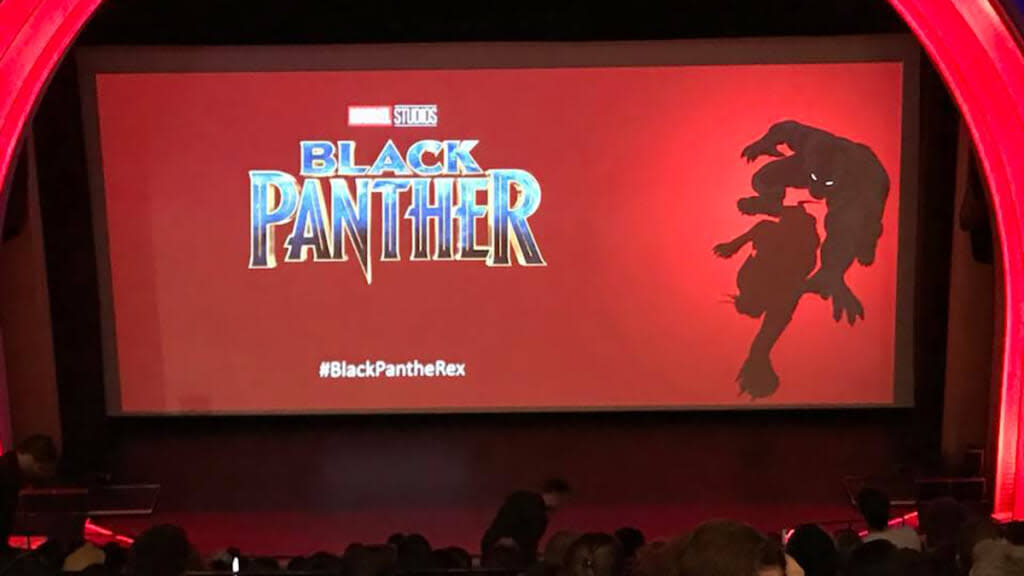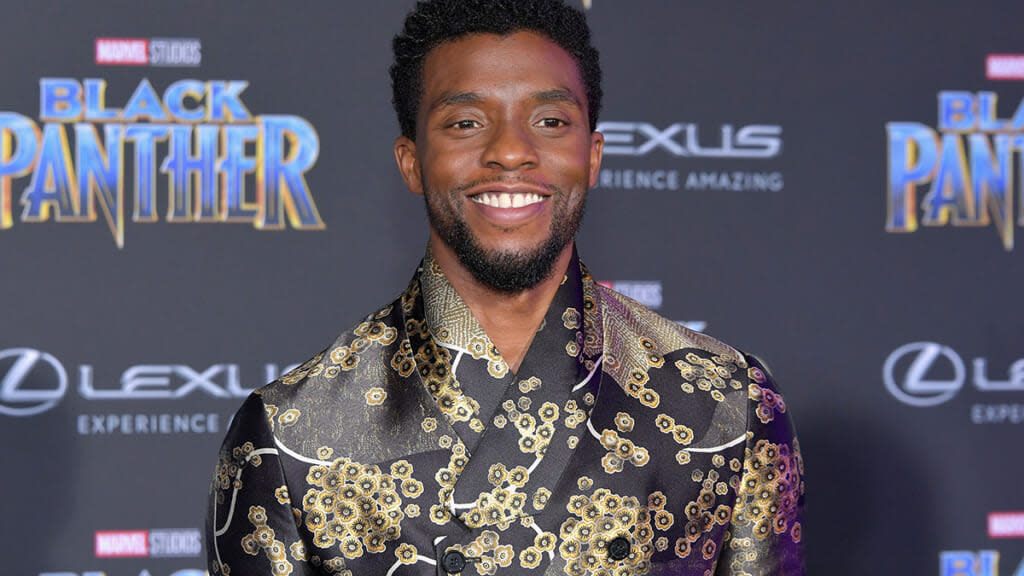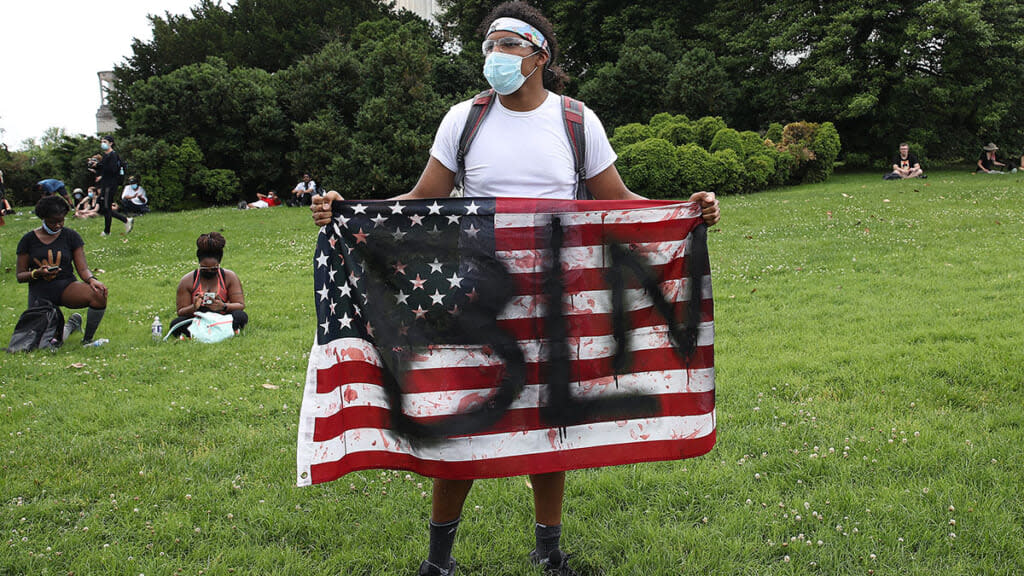Chadwick Boseman in ‘Black Panther’ helped expand Black imagination
OPINION: The late actor gave life to a world we don’t often get to see but desperately hope for
In a crowded theatre room in Le Grand Rex located in the middle of Paris’ 2nd Arrondissement, we were surrounded by Black joy. We’d waited in line for a couple of hours to get in; Black Panther was debuting in Europe a few days ahead of its United States release, and while we were away on vacation celebrating my 40th birthday, we’d decided to see the film’s international release ahead of everyone back home.
It was uncharacteristically cold in Paris that year. Tufts of snow were on the ground and the air had the sort of bite that made it hard to stand still and admire the city’s various landmarks. But on that night the weather didn’t matter. The movie line stretched around the city block, and in it were every hue, origin, style, and expression of Blackness that I’d ever seen in one setting before.
Read More: Ryan Coogler reveals details on ‘Black Panther’ sequel at D23
As we all clamored into Le Grand Rex’s lobby, climbing the velvet steps and walking the golden promenade, everyone felt excited. No really. Everyone. Every man, woman and child around us — virtually all of them Black — started moving faster and faster up the stairs and into the various portals to their seat assignments. Appropriately, the crowd and the theater that we sat in, felt like they were brimming, vibrating with energy.

As we sat down and waited for the film to start, I looked down from the balcony seats we had. An entire valley of Black people spread out before and beneath us in rows and rows of laughter and excitement. All around us, I heard a cacophony of international languages; some English, some French, a host of African and Caribbean accents jittered around us.
When the lights finally lowered, the credits began taking roll, the cosmos, spiritual, astral opening taking shape on the massive, silver screen to explain the origin of the Black Panther, you couldn’t hear a thing over the din of cheering and chattering that started from the parting curtain drapes well into the first five minutes of the movie.
In a normal movie-going experience, this would’ve driven me crazy. But this wasn’t just any movie-going experience and this wasn’t just any film. It was Black Panther, a film whose very presence — in trailers, in posters, in full-on Blackness — seemed to redefine our social media, encounters, workplaces, schools, fashion, hair, hashtags, hopes and beliefs months before the film ever made a proper appearance on-screen.

#WakandaForever became as much about solidarity amongst us as a note of strength and defiance. Its cross-chested gesture — banded across the chests of school children, graduating classes, professional groups, and Black fraternities — became a unifying symbol across the Black spectrum.
On the streets, in restaurants, at brunches — everywhere there was us, there was that gesture. It, along with the movie, went viral in an astounding way, and felt as unique to the film as it did familiar to The Struggle. It at times seemed like a protection, a projection, a deflection, and probably most unsettling to a country between the tents of racial climate hottened again, an insurrection, too. It, like the movie’s titular character and settings, came to mean many things to many of us at different times.
Chadwick Boseman was, of course, many things in real and filmatic life. He was a Bison, a husband, a father, a friend and an actor. Onscreen he also played Thurgood Marshall, Jackie Robinson, and James Brown — all iconic Black men whose mixture of power, genius, talent and intellect made them legends within our community. Those were important roles, and ones that Boseman seemed to relish and hold with honor and respect that solidified his presence in each one.
Read More: How Chadwick Boseman became an icon of Black identity

We are still struggling to find venues to tell new stories, but Boseman brought a liveliness and passion to his films that not only made them feel fresh, but new and accessible for a generation of audiences kept from our histories. This is what we do though; the best of us know the importance of being a vessel for our community.
It is important to remember where Chadwick Boseman and T’Challa sat. By early 2018, America was post-Obama and two years into Donald Trump, a man that a month before Black Panther’s release, referred to Haiti and African countries as “shithole countries,” who in 2017 scolded and denounced the NFL’s peaceful protester players as “sons of bitches,” that he opined their team owners should “fire,” and has a persistent, dog-whistling regard for Chicago.
Where there is a density of Blackness, there has been the current president, ready to diminish and dehumanize it, his only diplomatic graces surfacing when there are the nationalist rank-and-file that appear at his anemic rallies and on the streets of Charlottesville, where there are “good people.”
2018 was also at the height of the Black Lives Matter, the latest, necessary revolt against our besieged humanity as we’d witnessed Black person after Black person visually waylaid by seeped-in racism in our police force, political process, and cultural spaces.

It bears noting all of this because Black Panther arrived at a time when the chasm between Obama’s heroism and Trump’s villainy felt like universal forces we were caught between. As one receded, another ascended, and a ripple of need was clear for Black people to find something new to galvanize us.
As the promotional roll unspooled itself, Black Panther was an antidote many of us needed. We needed not only a new story, but a new cultural hero. Boseman, as a result, was right on time; a fictional king and hero that represented a world and destiny that seemed like an ark for us to board.
For many writers and creatives, the presence of Black Panther was parallel or at least part of the Obama Effect; opening up doors and imaginations across media and industries about the overlooked brilliance and talent that simmered underneath their gaze and within our ranks all along.
Read More: Obama, in scathing Trump rebuke, warns democracy on the line
Personally, Black Panther was my Obama, as it and he were for many writers; traditional newsrooms, staff writing rosters and editors couldn’t close the proximity of this character, this story or this moment. Bleeding outside the character came the need for more Black pens, voices, perspectives, imaginations and stories.
It activated within many of us the tools and opportunities to start crafting the conversations, worlds and artifacts that reflected who we have always been while pointing toward the potential of an even greater destiny. The posters and trailers and images of a unifying greeting, a community of differing Black thought, wants, politics, intellect, relationships, histories, inventions and appearances that felt wholly our own was, if you will, something to marvel.

In his passing, he left us with something precious: boundless imagination for not only what the future beheld for him, but for many of us, too. There will hopefully be another T’Challa — because the importance of carrying our stories and beliefs forward means, in part, that we need to be able to see many and any of us in the role — but there will never be another moment of the cultural time that Chadwick Boseman gave us that started with James Brown but ended with King T’Challa, the Black Panther, something that rose higher than any of us imagined.
Read More: Chadwick Boseman, Eisa Davis co-producing untitled Little Rock Nine limited series
Our sense of liberation, of destiny, of greatness, lies within our ability to connect ourselves to stories across time. For Black people in particular, the act of storytelling is an important component of accessing not only the greatness that came before us, but as a reminder that as it has happened before, so be it possible to happen again. There are clues and truths to what it takes for Black people to don the elements of power to unlock our greater destinies.
Get on Up, Marshall, 42 fit along the important spectrum of that clarity about both our accomplishments but also our aspirations. They also reminded us of how often there will still be the question of not only what, but if, Black excellence can thrive in the United States in a way that affords all kinds of Black people to vibrate in amazement.
Boseman, as a result, was both key and king of this. The stories he inhabited about our past were the ever-important contributions toward how we construct an archive about our brilliance, but as The Black Panther, T’Challa, King of Wakanda, he was the graceful, beautiful, majestic face of a world we still sometimes are only dreaming of.
Chadwick Boseman played men who were real, but what was uniquely special about Black Panther is that he gave life to a Black imagination and world we don’t often get to see but desperately hope for, hopefully not forever.

Tre Johnson is a freelance writer on race, culture, and identity with bylines in Washington Post, Rolling Stone, Slate, New York Times, Vanity Fair, and other major publications. He is based in Philadelphia, PA.
Have you subscribed to theGrio’s podcast “Dear Culture”? Download our newest episodes now!
The post Chadwick Boseman in ‘Black Panther’ helped expand Black imagination appeared first on TheGrio.
